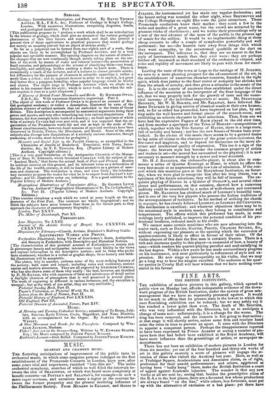MUSIC, QUARTET AND CHAMBER MUSIC.
TEE flattering anticipations of improvement of the public taste in orchestral music, in which some sanguine persons indulged on the first establishment of the Promenade Concerts in London, have now, after some years trial and experience, vanished "into thin air." The noble orchestral symphony, snatches of which so well filled the intervals be- tween the acts of SHAKSPERE, or which was heard more completely at benefit concerts—at Forma's and Setsmues, for example—is now a mere caput mortuum, and occasions many a regret at the contrast be- tween the former prosperity and the present declining influence of the Philharmonic Society. From MusAnn to Ehusoer, and thence to 1 Jtaxrett, the instrumental art has made one regular declension; and the basest string was sounded the other night, when BEETHOVEN and the College Hornpipe on eight fifes were the joint attractions. These Promenade conductors know thew market : they catch a few in the webs and meshes of a great name, but the crowd are attracted by the
grossest tricks of charlatanrie ; and we notice their proceedings only as a test of the real advance of the mass of the public in the present age of music for the million. It would be no impracticable thing at these cheap concerts to offer a couple of symphonies powerfully and well
performed : but no—the hearers turn away from things with which they want sympathy, to the accustomed quadrille or the duet on the cornopean. The inference is, that they are no nearer to the fine style of instrumental music than they ever were: they are perhaps farther off, inasmuch as their standard of the orchestra is vitiated, and noise and rapidity of movement are likely to pass with them for excel- lence.
Leaving the taste of the town at large to the tutelage of M. Jammu% we turn to a more pleasing prospect for the advancement of the art, in the establishment of numerous chamber-concerts, founded in the right spirit, which does justice to the finer stores of antiquity but shrinks not from the attack of novelty, and thus gives a stimulus to the music of the day. It is to the coterie of amateurs thus established under the direct influence of the musician as the interpreter of the finer language of the art, that we may properly look for the growth of taste and the nume- rical increase of the individual supporters of music. Mr. STERNDALE BENNETT, Mr. W. H. HOLMF.S, and Mr. SALAMAN, have followed Ma- dame DULCKEN in giving soirees of classical music at their own houses; and, so far as either has proceeded, have improved on her plan, by set- ting aside the well-known and formal pieces of the concert-room, and exhibiting an eclectic character in their selections. Thus, from one we have had the expressive Fugues of Baca played in the old slow time, and from another a specimen of the Trios of Mower—compositions of which, together with the Trio Sonatas of HAYDN, there is a large store, full of novelty and beauty; nor has the new Sonata of SPOHR been over- looked. In the choice of this music there seems to be a general desire to lay aside all claims to the character of the great artiste-executant, the fire-eater and magician, and to depend for distinction on the more ab- stract and intellectual quality of expression. This too is a sign of the times: the bravura style has become the common property of artists and traders in art—the mental has succumbed to the physical ; it is now necessary to measure strength by a newer and truer standard. Mr. H. J. BANISTER, the violoncello-player, is about also to com- mence a series of Quartet Evenings at Home, in which he offers the very best music at an unprecedentedly low rate of admission. If the con- cert which this musician gave at the Marylebone Institution, on Satur- day, when we were glad to recognize him after his long illness, was a specimen of his future selections, they will be full of interest. The ex- quisite playing of DANDO in a Quintet of OssLow's, and several other pieces and performances, on that occasion, showed how a numerous auditory could be entertained by a series of well-chosen and contrasted pieces. Mr. BANISTER has obtained much of LINDLEY'S beautiful tone, and is one of the very few players who possess the Italian traditions of the accompaniment of recitative. In his method of striking the chords in arpeggio, he has closely followed LINDLey, as LINDLEY did CEeverro. His mechanism is excellent ; and whatever objections there may be to his occasional style in modern music, they belong to constitution and temperament. The efforts which this performer has made, in some writings lately published, to improve the personal condition of his pro- fessional brethren, redound much to his credit. We cannot name certain musicians who are now advancing into the senior rank, such as DANDO, GArrre, Picorr, CHARLES SEVERN, &C., without expressing our pleasure at the opening which the extension of quartet-concerts is likely to effect in favour of their talent. Of the violin-players of this date the first man is certainly DANDO. There is a rich and unctuous quality in this player—a command of bow, a beauty of tone—which renders his quartet-playing peculiar and soul-satisfying in the last degree. Within a few years he has made extraordinary progress on his instrument, and most particularly in refinement of style and ex- pression. He now sings so incomparably on his violin, that we may go a long way to hear his adagios excelled. The audience at his quar- tet-parties in Crosby Hall will bear witness that we have nothing over- stated in his favour.


























 Previous page
Previous page